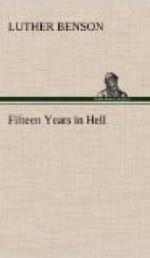physically, but being of a strong, vigorous, and healthy
constitution, I was almost completely restored by the
following morning. Of course I resolved and promised
my father and mother that I would never again taste
liquor. For some time I faithfully kept my promise,
and for weeks the very thought of liquor was revolting
to me. No one becomes a drunkard in a day or
week. Alcohol is a subtle poison, and it takes
a long time for it to so undermine man’s system
that he finds life almost intolerable unless stimulated
by the hell-broth which must surely destroy him in
the end, unless he closes his lips like a vise against
it. But for me, I never could drink, from my
childhood, without coming under the influence of the
accursed poison. I never drank because I liked
the taste of liquor, but because I liked the first
effects of it. I was never able to tell good
liquor or rather pure alcohol—for such a
thing as good liquor has never been made—from
the worst, the meanest, manufactured from drugs.
The latter may be more speedy than pure alcohol, but
either will destroy with fatal certainty and rapidity.
I drank, as I have said, for the effects, and in the
first years of my drinking my first emotions were
pleasurable. It sent the blood rushing to the
brain, and induced a succession of vivid and pleasing
thoughts. But invariably the depression that
followed was in the same ratio down as the former was
up, and after a time I lost that first pleasant, unnatural
feeling, and drank only to satisfy an indescribable
passion or craving. At first the wine glass may
sparkle and foam, but let it never be forgotten that
within that sparkle and foam is concealed the glittering
eye of the uncoiled adder. It is the sparkle
of a serpent’s skin, the foam of the froth of
death. Here I must confess that for the past
five or six years I have not been able to attain one
moment’s pleasure from drinking. Every glass
that I have touched has proven to be the Dead Sea’s
fruit of ashes to my lips. I drank wildly, insanely,
and became oblivious for days and weeks together to
all which was about me, and finally awoke to the horrors
which I had sought to drown, but now intensified a
thousand fold. No man ever buried sorrow in drunkenness.
He can not bury it that way any more than Eugene Aram
could bury the body of his victim with the weeds of
the morass. Whoever seeks solace in whisky will
curse the hour which saw him commit a mistake so fatal.
Woe to him who looks for comfort in the intoxicating
glass. He will see instead the ghastly face of
murdered hope, the distorted vision of a wasted life,
his own bloated corpse. The habit of drink after
a time becomes more than a mere habit; the system
comes to demand and crave liquor, it permeates and
affects every part of the body until every function
refuses to perform its part until it has been aroused
to action by its accustomed stimulant.




